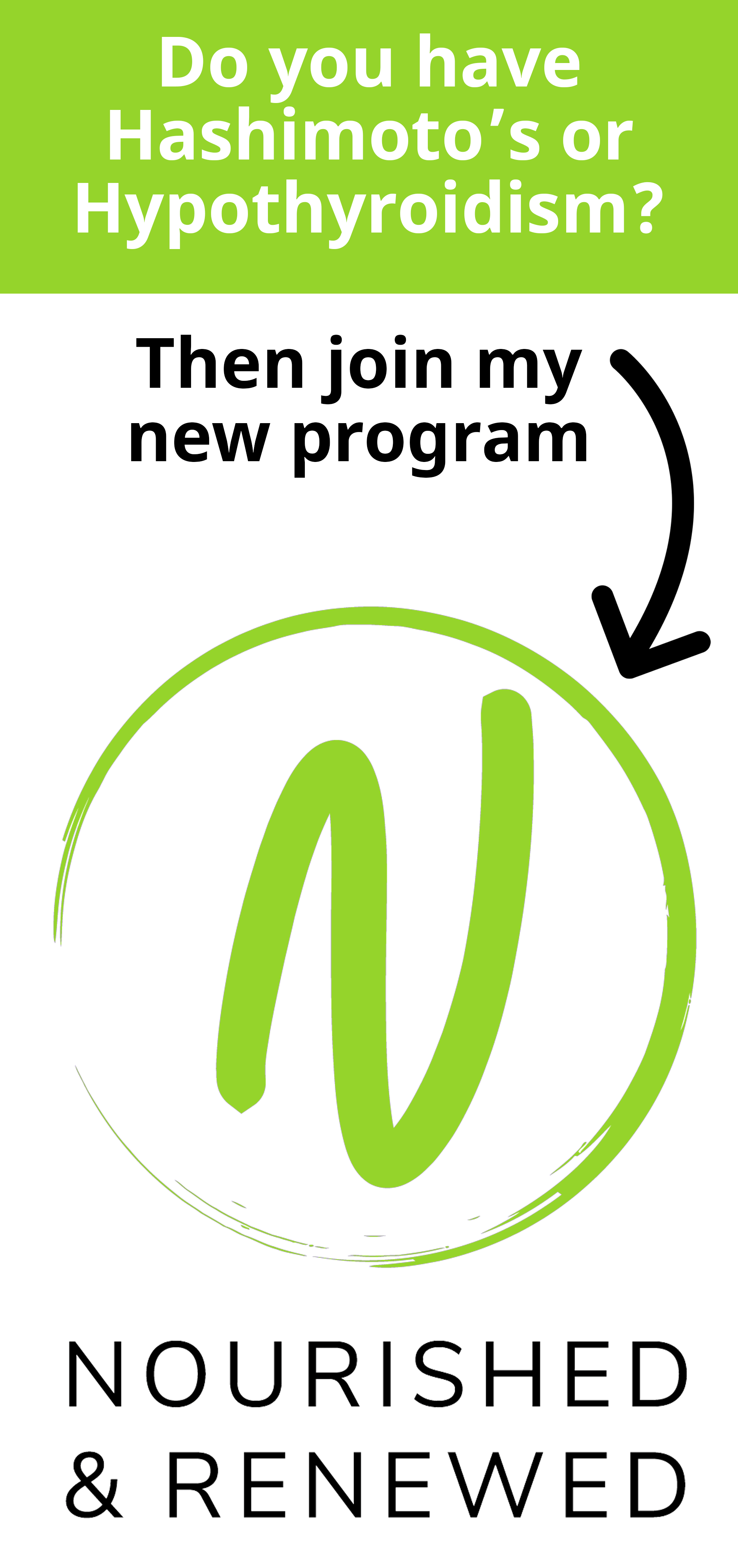I have hormone imbalance and I want to fix it naturally
When my clients come to me with a condition or set of complaints/symptoms they hope to resolve through nutrition. But they rarely say, “I have hormone imbalance and I want to fix it naturally.”
Usually, most people do not know that their health problems are related to something as seemingly benign as their delicate hormone interactions.
“Hormone problems” are reserved for the overwhelmed woman raising three kids, working full time, and having little (if any) sex drive for intimacy with her partner.
Men rarely associate their concerns with hormones. Aging, maybe. Stress, definitely.
But, hormones?
Two clients come to mind:
“Jenny” is 32. Happy, healthy and ready to start a family. She and her husband have been trying for a while now and things are “just not working” like they thought they would.
Jenny admits to somewhat irregular periods. She craves sweets in the afternoons. Her once long and lustrous hair feels drier and has been coming out on her hairbrush more recently.
Jenny gets wicked migraines two to three days per month, making intercourse impossible and regular daily tasks much more challenging.
She thinks something “might be off.”
I suggest a hormone test and it reveals high cortisol and high estrogen, relative to her progesterone level.
Definitely hormones.
Another client - “Jim” (age 44) came in to talk about his troublesome restless legs, insomnia, racing heart and difficulty coping with stressful situations. His digestion is off.
He admitted some big life changes, including the recent loss of a loved one.
Jim knows these symptoms are really interfering with his life. He knows “something is off” but he can’t figure it out.
I mention looking in to his hormones and he has a good chuckle: “everything is fine in that department.”
We test his hormones and low cortisol and low testosterone appear to be culprits.
To say Jim was surprised is an understatement.
My Experience with Hormone Imbalance
So, listen, people...I have definitely experienced messed up hormones. Big time.
In fact, even now - without constant vigilance - my hormones will tend to go awry.
That’s because I have Hashimoto’s thyroid disease.
As a result I suffer from ongoing adrenal fatigue as well as wonky reproductive hormones.
They are all connected.
My low-functioning thyroid definitely makes a mess of my other hormones.
With autoimmunity, I need to work daily to support my hormone system.
More importantly, hormone balance within the endocrine system is dependent upon a healthy, functioning H.P.G.A.T. axis.
H.P.G.A.T. axis stands for Hypothalamus, Pituitary, Gonads, Adrenals, Thyroid.
Dr. Lam’s website describes the interrelationship between these endocrine organs (glands) in this way:
“What happens to one organ will affect the other organs physiologically, clinically or sub-clinically. These three organs are therefore intimately co-dependent hormonally on each other for optimal function.
If the adrenal glands are weak, there is often concurrent thyroid malfunction and menstrual cycle irregularity. Similarly, an under-active thyroid often makes adrenal fatigue worse off.
Lastly, those who suffer from ovarian hormone imbalance symptoms such as estrogen dominance often have any pre-existing subclinical hypothyroidism exacerbated.”
Wow, right?
I mean who knew that all of these organs/glands literally depend on each other to function normally?
This means I have to pay attention to the other guys as well.
It’s not just enough to take care of my thyroid and call it a day.
I have to work hard to implement dietary and lifestyle choices that benefit my entire endocrine system.
For all of us, a hormone system out of whack has farther-reaching implications than just one hormone imbalance by itself.
When I get overly busy, stressed, sick or run down, all my glands/organs start poking at me to pay attention to self-care and healing.
I have experienced the following symptoms related to hormonal imbalance in my H.P.G.A.T. axis:
- insomnia
- chronic fatigue
- migraines
- joint pain/muscle pain
- exercise intolerance
- brain fog, forgetfulness
- poor digestion of carbohydrates
- feeling cold
- hot flashes
- sluggish detoxification
- premenstrual syndrome (PMS)
- anxiety/depression
So, when I feel this way, rather than popping some vitamins and crossing my fingers, I actually have to do the hard work.
I begin by assessing where things are breaking down in the H.P.G.A.T. axis. Then, I address the root cause of the hormonal upset.
And, finally, I gotta get to work on righting the ship.
A little unbalance can cause big problems. The good news is: little tweaks can make big improvements.
It takes time to balance hormones.
It’s important to know that the effort to balance hormones can make a world of difference in your overall body/mind and spiritual health.
What Exactly Are Hormones Anyway?
Hormones are chemical messengers in the body that travel in the blood to organs and tissues signaling them to do the work they were designed to do.
They are messengers!
Both men and women both have hormones, and hormone levels change and develop as we grown and age.
Because they are messengers, hormones play a role in essentially every process in our body.
Hormones affect reproduction, sexual function, metabolism, growth and development, and even mood.
For optimal health, proper hormone balance is crucial.
H.P.G.A.T. Axis Glands and Functions
Here is a little bit more about these crucial glands which rule over essential hormones in our bodies:
The hypothalamus
It is a portion of the brain with the most important function of linking the nervous system to the endocrine system via the pituitary gland. It is about the size of an almond.
The hypothalamus is responsible for the regulation of certain metabolic processes and other activities of the autonomic nervous system. It synthesizes and secretes certain neurohormones, called releasing hormones or hypothalamic hormones.
And these in turn stimulate or inhibit the secretion of hormones from the pituitary gland.
The hypothalamus directly controls body temperature, hunger, important aspects of parenting and attachment behaviors, thirst, fatigue, sleep, and circadian rhythms.
The pituitary gland
It is often called the master gland because it controls several other hormone glands in your body, including the thyroid and adrenals, the ovaries and testicles.
Your pituitary gland is about the size of a pea and is situated in a bony hollow, just behind the bridge of your nose. It is attached to the base of your brain by a thin stalk.
The gonads
They are the male and female primary reproductive organs. The male gonads are the testes and the female gonads are the ovaries.
These reproductive system organs are necessary for sexual reproduction. They are responsible for the production of male and female sex hormones needed for the growth and development of primary and secondary reproductive organs and structures.
They also produce the sex cells which lead to development of new offspring when conception occurs.
The adrenal glands
They are triangular-shaped, walnut-sized glands which sit at the top of each kidney.
Each adrenal gland contains an outer adrenal cortex. It’s responsible for producing certain steroid hormones, including aldosterone and cortisol.
Each gland also contains an inner adrenal medulla, which produces several other hormones, including adrenaline and noradrenaline.
Aldosterone helps control your blood pressure by managing the balance of potassium and sodium in your body.
Cortisol works in conjunction with adrenaline and noradrenaline to help regulate your reaction to stress. Cortisol also helps regulate your metabolism, sugar levels, and blood pressure.
The thyroid gland
It is a butterfly-shaped gland in your neck, just above your collarbone.
It is one of your endocrine glands, which make hormones. These thyroid hormones control the rate of many activities in your body.
Specifically, the thyroid regulates how fast you burn calories and how fast your heart beats. All of these activities make up your body's metabolism.
Females and Their Hormones
OK, now we need to talk about the hormones affecting women, specifically. I am talking about estrogen and progesterone.
Estrogens
The “estrogenic” hormones are uniquely responsible for the growth and development of female sexual characteristics and reproduction.
The term "estrogen" is actually a group of three chemically similar hormones: estrone, estradiol (the most abundant in women of reproductive age) and estriol.
Overall, estrogen is produced in the ovaries, adrenal glands and fat tissues. More specifically, the estradiol and estrone forms are produced primarily in the ovaries in premenopausal women.
Whereas estriol is produced by the placenta during pregnancy.
In women, estrogen circulates in the bloodstream and binds to estrogen receptors on cells in targeted tissues. This affects not only the breasts and uterus, but also the brain, bone, liver, heart and other tissues.
Estrogen controls growth of the uterine lining during the first part of the menstrual cycle. It causes changes in the breasts during adolescence and pregnancy and regulates various other metabolic processes, including bone growth and cholesterol levels.
In young girls, prior to menstruation, the first changes in hormones trigger bone growth. Then, they signal puberty beginning as the girl’s body matures.
These new hormones can cause breast tenderness, acne, mood changes and the start of menstruation.
Puberty typically occurs for females between the ages of 12 and 14, but can start as early as 9 and as late as 17.
Although rare, precocious puberty can occur and is characterized by the very early onset of puberty – as young as 6 or 7 years old. This is often a result of exogenous estrogens from the environment and diet, which negatively impact the endocrine and reproductive systems.
As the woman enters her childbearing years, her hormones are responsible for changes in muscle mass and weight management. They also play a fundamental role in pregnancy and the growth and development of her offspring.
I’ve also written an in depth article about balancing estrogen post-partum, which is often overlooked as a serious (and common) hormone imbalance in women after childbirth.
Progesterone
Progesterone is a hormone in the body that stimulates and regulates various functions. It's produced in the ovaries, the placenta (when you get pregnant) and the adrenal glands.
And it helps prepare your body for pregnancy and conception, regulates your menstrual cycle and impacts your libido.
If you don't have enough progesterone, you may have difficulty getting or staying pregnant.
It is important that estrogen and progesterone are balanced with one another. There is an ideal ratio for these two hormones - and in that perfect range, they work beautifully together.
When one is too high or too low, problems can arise.
Ladies, Side Effects of Hormone Imbalance Are Common
I already shared some of my symptoms when my hormones are out of whack. So many symptoms can be attributed to hormone irregularities or dysregulation of the H.P.G.A.T. axis.
In particular, with women aged 30 and older, a decrease in progesterone is responsible for many of her unwanted symptoms.
What do I see the most of in my office with women and their hormones?
Stress - more than any other outside force - contributes to problems in the H.P.G.A.T. axis for women.
Here is the typical scenario:
Thyroid dysfunction and hypothyroidism may lead to overworked adrenal glands and reduced cortisol. This can in turn decrease the output of reproductive hormones such as progesterone.
Side note:
Women also have a certain amount of necessary testosterone in their bodies. It too must be balanced with the other hormones.
Polycystic ovary syndrome (PCOS), which can lead to infertility, can be the result of high levels of testosterone. About 10 percent of women with high testosterone levels also have PCOS. I plan to write more about this in another post.
Common estrogen/progesterone hormone imbalances during a woman’s childbearing years may lead to:
- Skin changes/acne
- Mood changes/anxiety and depression
- Weight gain
- Low energy
- Low libido
- Infertility/pregnancy loss
At about age 45, most women begin to leave their childbearing years behind. They enter a stage known as perimenopause, a stage where hormone levels begin to change and pregnancy becomes less likely to occur.
Estrogen and progesterone levels drop during perimenopause and menopause, and infertility eventually sets in. Due to declining estrogen levels, some women will experience bone loss.
Menopause means that a woman’s ovaries have stopped producing estrogen, and her period has ceased for at least one full year.
In menopause, low levels of both progesterone and estrogen can lead to:
- mood swings and increased anxiety
- hot flashes
- sleep problems
- urinary or vaginal discomfort/pain during intercourse
- hair loss
- thinning, more dry or less elastic skin
- low libido
- aches and pains
- bone loss
- weight gain or loss
A pioneer in women’s health and hormones, Christiane Northrup, M.D., describes menopause as “an exciting developmental stage. One that, when participated in consciously, holds enormous promise for transforming and healing our bodies, minds, and spirits at the deepest levels.”
For many women, menopause presents new opportunities, freedom from childbearing and rearing, new creative expression and truth in self-expression.
Men and Their Hormones
Guys, you’re up next.
News flash!
Men and boys are also affected by hormones. For real, this is not just a woman’s problem.
Testosterone is the main sex hormone found in men. It controls male physical features. The testes (testicles) make testosterone.
(As I said, women have testosterone too but in much smaller amounts than in men.)
Why is testosterone important for boys and men?
Testosterone helps bring on the physical changes that turn a boy into a man. This time of life is called puberty.
Male puberty typically occurs between the ages of 9 and 14.
Changes include:
- Growth of the penis and testes
- Growth of facial, pubic, and body hair
- Deepening of the voice
- Building muscles and strong bones
- Getting taller
Men also need normal amounts of testosterone to make sperm and to be able to father children.
During this time, hormone changes can help contribute to weight control and muscle mass changes.
Between the ages of 18 and 40, men may notice their testosterone levels dropping.
Or, similarly, if estrogen levels rise too high in men, problems can arise. This is commonly due to environmental exposures to estrogen - such as from medications, conventional meats, plastics and chemicals in our environment.
Guys, Do You Know If Your Hormones are Out of Balance?
This checklist is a good place to start.
Hormone imbalances (too much estrogen/not enough testosterone) in a man’s mid-life may cause:
- Weight gain
- Decreased muscle mass
- Low energy levels
- Low libido
- Difficulty getting and maintaining an erection
- Insomnia
- Cravings, especially for sugar and carbohydrates
- Mood changes including depression, anxiety and aggression
- Skin changes
As men start to approach 50, testosterone levels will drop further.
Some men will struggle with osteoporosis or bone fractures. Infertility can occur as sperm count levels drop.
Erectile dysfunction, reduced energy, loss of hair, and low libido can occur because of falling hormones later in a man's life.
Hormone Imbalance Affects Nearly Everyone
Honestly, the story about hormones really doesn’t just start and end here in this article. There is so much more information that pertains to this very important subject.
I wanted you to get the general idea of how critical hormone balance is to your health - and your partner’s health!
And, frankly, statistics on the subject of men’s and women’s hormone imbalance-related conditions are limited.
By my practice estimates, 75% of women and 50% of men will have some kind of hormone imbalance diagnosed in their lifetime.
More than that will have symptoms of hormone imbalance that go undiagnosed or discussed with their health care provider.
This probably doesn’t surprise you.
But, the imbalances of hormones due to various life and health events have long-term implications for health in both men and women.
When your hormones are in balance, you feel good, look good, and have abundant sustainable energy.
When your hormones are out of balance, you may experience a wide range of symptoms that can affect mood and energy.
Over time, hormone imbalance may lead to serious conditions.
For example, development of enlarged prostate or testicular cancer can happen in men while uterine fibroids or fibrocystic breasts in women.
While hormone positive cancers, thyroid dysfunction or Type II diabetes can develop in both genders.
How To Balance Hormones Naturally
Yes, you can do this. You can balance your own hormones through some holistic approaches to food and lifestyle.
Food Plan To Support Healthy Hormones
Eat three meals per day.
Promote metabolic maintenance by jump-starting your metabolism with a healthy, balanced breakfast. Think “fuel your day” and consume meals which support your energy and activity needs throughout the day.
I like the saying: “Breakfast like a king, lunch like a prince and dinner like a pauper” because we need to consume the majority of our calories earlier in the day.
What we consume in the evening often disrupts digestion and can be stored more easily as fat because we are less active.
Eat protein with each meal.
Pasture-raised eggs, wild-caught fatty fish such as salmon, grass-fed lamb, bison or beef are all good choices. Protein helps to support lean mass and thereby also promote a strong metabolism.
Strong muscles as we age helps to support the skeletal system and ensure bone health.
Protein-rich meals contribute to the body’s use of amino acids (the building blocks of protein) which are used to heal endocrine tissues and organs. It also promotes the development of healthy hormones.
Understand and moderate your intake of carbohydrates.
Not all carbohydrates are created equal. Minimize intake of refined carbohydrates, such as sugar, white rice, bread and alcohol. Moderate your intake of foods made with white flour, such as muffins, bagels, pasta, pretzels and other snack foods.
All of these turn into an abundance of sugar in the body.
In turn, this sugar creates insulin resistance over time, and can lead to blood sugar imbalances.
Excess sugar in the bloodstream is ultimately stored as fat.
Carbohydrate consumption should focus on fresh, raw, unprocessed fruits and veggies (organic as much as possible!), whole grains and occasional beans/legumes. Note: gluten-free grains are preferred for lowering inflammation.
Increasing your fiber is key to managing healthy hormone balance naturally, as fiber acts like a broom to bind and escort hormone metabolites out of the colon.
Eat a wide variety of organic, fresh fruits and vegetables daily.
I suggest starting small – maybe 2-3 servings at first while your body gets used to the extra fiber. And, over time, aim for up to 10 servings of fresh fruits and veggies per day!
A serving is approximately four ounces, or a half-cup. Eat the rainbow! Choose as many brightly-colored fresh fruits and veggies as possible.
Go for broccoli, green leafy vegetables, bold berries, red, yellow and green peppers, and tomatoes, and bright orange squashes.
Eat more healthy fats.
Essential fatty acids (EFAs), omega–3, omega–6 and omega-9 fats, are needed to assist the body in many important functions, including those of the brain and nervous system.
Good sources of EFAs include pasture-raised eggs, high-quality flax seeds, chia seeds, walnuts, cold-pressed extra virgin olive oil and cold-water fatty fish harvested from the wild.
Grass-fed beef is also a great source of EFAs.
I suggest eating one half of a ripe avocado each day to help support your brain, nervous system, immune system and healthy hormone balance.
Boost antioxidant capacity.
Antioxidants combat cellular damage from free radicals.
They are known to be a cause of chronic conditions such as heart disease, cataracts, macular degeneration, and cancer.
Antioxidants are found in fresh fruits and vegetables, especially brightly colored ones.
Food is the best source for antioxidants.
It contains the “magic” of all the nutrients and antioxidants combined (so much of the nutrition from food has yet to even be studied in detail!)
Drink alcohol in moderation or skip altogether.
Alcohol is a potent pro-aging beverage. As we drink alcohol, the whole body must utilize its various resources to combat the toxicity and damage.
The liver - your main detoxification organ - is most susceptible to the damage from continued alcohol use.
But, also the nervous system, immune system and digestive system become taxed over time.
Some people believe that daily red wine consumption improves cardiovascular health. But actually in the long run, excess wine consumption can increase your risks of heart damage and disease.
For women, alcohol consumption can disrupt the menstrual cycle and impair hormones. This leads to infertility, increased symptoms of PMS, and a more difficult time transitioning to menopause.
For both men and women, alcohol consumption is linked to mood changes – worsening of depression and anxiety.
Dependence on alcohol can alter your brain chemistry and lower the levels of mood-regulating neurotransmitter serotonin.
This makes stress responses and coping with everyday challenges more difficult over time.
Hydrate as much as possible!
Drink one half your body weight in ounces every day to maintain your body’s reserves of water – essential for healthy hormone production.
Purchase a water filter for your home sink to reduce toxins, bacteria, metals and contaminants from a municipal water source.
Reduce your intake of bottled water to avoid the toxins in plastics which are known endocrine disruptors.
Herbal teas, fresh pressed juices and broth-based soups all contribute to your daily water intake. Water is life!
So, drink up to your health!
Supportive Supplements For Men and Women
Zinc:
Zinc promotes ovulation in women, healthy sperm production in men, may help reduce acne and has natural anti-inflammatory benefits.
It is also essential for the synthesis of thyroid hormone.
Magnesium:
Plus it is a critical co-factor in the production of all of the hormones.
Vitamin B6:
Vitamin B6 helps many women manage PMS symptoms, improves energy and supports healthy progesterone production.
Essential Fatty Acids (EFAs):
Specifically docosahexaenoic acid (DHA) and eicosapentaenoic acid (EPA) maintain ideal cell membrane fluidity.
They allow optimal transport of hormones across the cell membrane and into the cell, where hormones affect the health of each cell.
Liver support herbs:
Turmeric, coriander, parsley, cilantro and oregano are great to boost glutathione production and also lower inflammation.
Also milk thistle, holy basil and dandelion are superb for liver health and total body wellness.
Adaptogenic herbs for stress (including ginseng, ashwagandga, maca, rhodiola, holy basil and cocoa):
They balance, restore and protect the body, making it easier to handle stress by regulating hormones and physiological functions.
Antioxidants (including vitamins A, C and E, Gingko Biloba, Grape seed, Pine bark and curcuminoids):
They protect cells against free radical damage and thereby promote healthy hormone function inside the cells.
Vitamin D:
It helps regulate adrenaline, noradrenaline (also called norepinepherine), and dopamine production in the brain. In addition, it helps to protect the brain from serotonin depletion.
Researchers have found that adequate vitamin D levels reduce an individual's risk of depression significantly.
Probiotics:
They aid in repairing your gut lining, which in turn can balance your hormones. When undigested food particles, like gluten for example, leak through your gut into your bloodstream, it causes disease-causing inflammation .
And that impacts the entire body.
Please Note: This is a quick list for reference purposes.
My suggestions here do not take into consideration your own needs and nutrient status.
For more detailed information on your personalized supplement regimen, consider my Super Girl/Super Guy program.
Lifestyle Measures to Help Heal and Balance Hormones
I honestly think the habits we employ in our day-to-day lives are the best approaches for healthy hormones.
The positive results do not typically occur right away. But as a rule, simpler, happier living and natural, straightforward remedies will go a long way to keep your body in balance for life!
My 9 best habits to integrate into your day to day
- Get a minimum of 30 minutes per day of moderate physical activity - a quick jog, bike ride, fast walk, yoga, HIIT class or jumping on a trampoline all count!
- Try laughter - it really is the best medicine!
- Surround yourself with supportive people - a positive and caring crew around you will benefit your health in a million ways.
- Get plenty of sleep - try to get 8 hours per night. Plan for a proper bedtime routine with relaxation techniques to help you fall asleep quickly and stay asleep all night. Baths, stretching, reading, meditation/prayer and journaling all work for me.
- Practice stress management - coping with stress through meditation, breathing, visualization and mantras. They are effective ways of signaling the brain to reduce stress hormones, inflammatory cytokines and even stress-associated pain.
- Use essential oils - my favorite is lavender oil, which I diffuse in an oil diffuser. It promotes emotional balance by helping to calm anxiety, depression, moodiness and stress.
- Replace your body care products. Take a look around your home and eliminate toxins in your body by avoiding conventional body care products. They are usually made with potentially-harmful chemicals including DEA, parabens, propylene glycol and sodium lauryl sulfate.
- Monitor and reduce electromagnetic frequency (EMF) radiation - EMF exposure has been found to alter reproductive hormones (especially sperm count and motility in men). And they negatively impact pregnancy. These have serious consequences on fetal development. Reduce the frequency, duration of exposure, and strength of EMFs in your life by spending less time around technology devices. Or you can implement a shield like one of the products from Aires EMF Protection.
- Beware of medications' impact on hormones - medicine can disrupt your hormone balance, leading to side effects like fatigue, appetite changes, altered sleeping patterns, low libido, and even depression. This includes corticosteroids, stimulants, statins, dopamine agonists, rexinoids and glucocorticoids. Please talk to your doctor about the side effects and research natural alternatives whenever possible.
Not Sure If You Can Hack Your Hormones?
This is a huge area of our health, amiright?!
Hormones pretty much rule everything! Trying to balance them on your own might feel overwhelming or impossible.
I have some tricks up my sleeve that help bring pretty quick hormone-haywire relief:
- Test your hormones with a four-point saliva hormone test.
- Test your nutrient status using the Spectracell micronutrient test.
- Plan and implement an effective hormone detox program, quick or long-term, depending on your needs.
- Discuss bio-identical hormone creams where necessary.
- Develop a custom body-type meal plan based on your body shape, tastes, cravings, nutrient needs and lifestyle.
- Track and monitor your weight and body composition with bio-impedance analysis.
- Coordinate care with your OB/GYN, primary care doctor, naturopath, acupuncturist, etc., to get the most streamlined treatment possible.
Hang in there! Hormones don't have to ruin your life.
Quite the contrary, balance is achievable and will make you feel incredible!
I have been there, so I know exactly how crazy hormone problems can make you feel. 🤪
If you are feeling stuck on this subject, let's talk.













